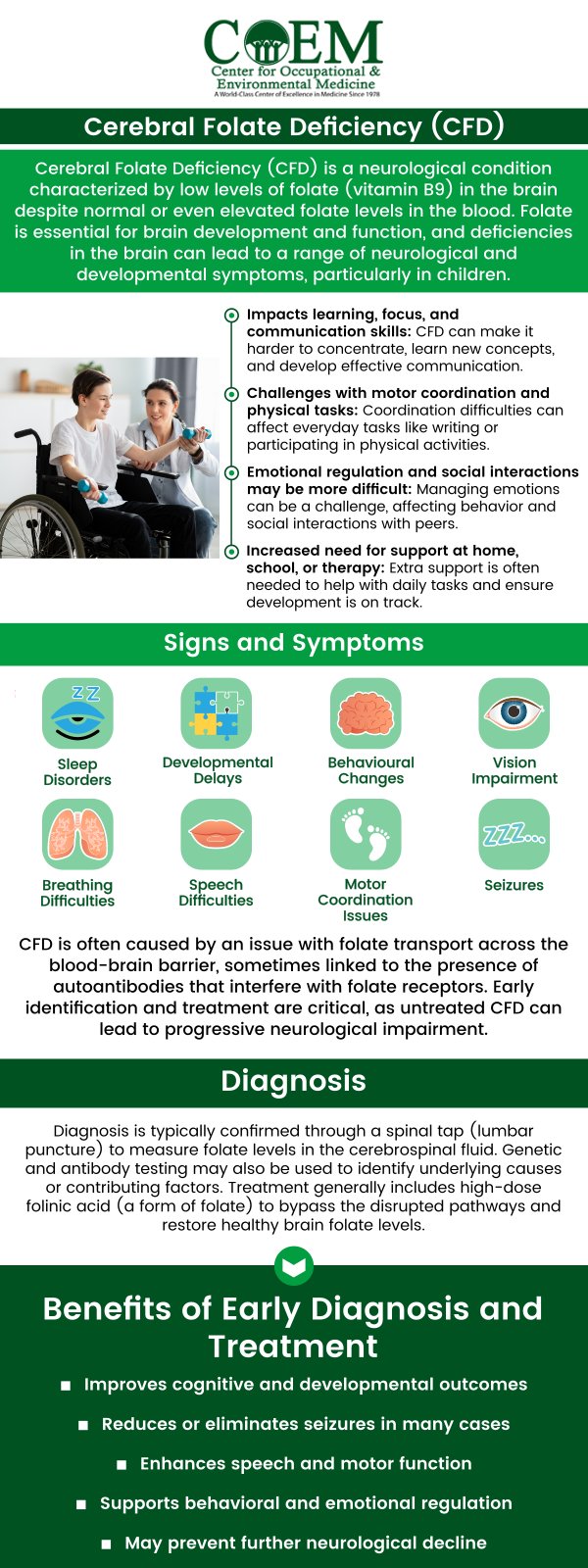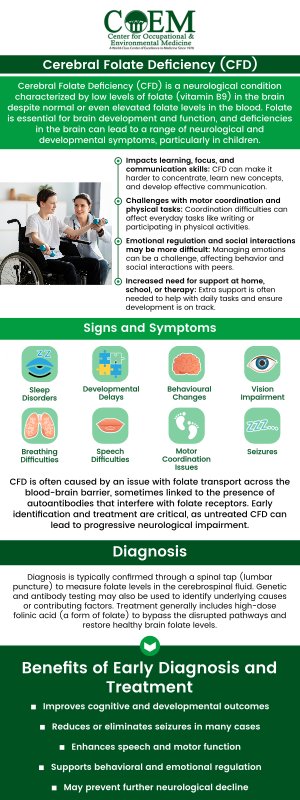Cerebral Folate Deficiency in Autism: Symptoms, Diagnosis, and Treatment
Cerebral folate deficiency in autism can present with a variety of symptoms, including developmental delays, language issues, motor difficulties, and seizures. Early detection is crucial, as it allows for targeted interventions that can improve outcomes. Our medical team at The Center for Occupational and Environmental Medicine (COEM) specializes in diagnosing and treating cerebral folate deficiency in children with autism, providing a comprehensive approach to care that supports neurological and developmental health. For more information, contact us today or schedule an appointment online. We are conveniently located at 7510 North Forest Drive North Charleston, SC 29420. Patients routinely fly in to be evaluated by COEM, as we serve patients internationally. Find out if you have been exposed, extensive lab testing is available.


Table of Contents:
How does cerebral folate deficiency impact individuals with autism?
What are the symptoms of cerebral folate deficiency in children with autism?
Can cerebral folate deficiency cause developmental delays in autism?
How early can cerebral folate deficiency be detected in children with autism?
Cerebral folate deficiency is a condition where the brain does not receive an adequate amount of folate, a vital nutrient involved in neurological development and function. For individuals with autism, this deficiency can interfere with the nervous system’s development and communication. Folate plays a crucial role in producing neurotransmitters and supporting brain metabolism, so without sufficient folate, certain brain pathways may not function efficiently. This imbalance can impact behaviors, cognitive abilities, and overall neurological health.
The effects of cerebral folate deficiency in individuals with autism often manifest in their interactions with their environment. Parents or caregivers may notice changes in mood regulation, reduced attention span, or difficulties with social interactions, which may become more pronounced. In some cases, the deficiency may contribute to repetitive behaviors or a reduced ability to adapt to new routines.
Specialists at The Center for Occupational and Environmental Medicine (COEM), including the only MedMAPS-certified physician in South Carolina, Dr. Stephen P. Elliott, MD, use a targeted approach to address cerebral folate deficiency in children with autism. This approach provides patients with a thorough evaluation and therapies designed to restore folate metabolism balance and promote healthier neurological outcomes. With proper care, many individuals experience improvements in their quality of life and an increased ability to engage more fully in daily activities.
Children with autism who are affected by cerebral folate deficiency may present with a combination of neurological and behavioral symptoms. One common indicator is difficulty with communication or language development that deviates from the typical autism pattern. Motor delays, such as challenges with coordination or muscle control, may also emerge. In many cases, seizures or seizure-like activity have been linked to this deficiency. Additional symptoms can include irritability, mood instability, or sudden changes in behavior. Caregivers may observe that a child who previously tolerated certain environments or activities becomes more sensitive to them. Sleep disturbances, developmental regression, or a lack of progress in therapy may also raise concerns. These signs often overlap with common challenges in autism, but the presence of cerebral folate deficiency can make them more pronounced or resistant to traditional interventions.
At COEM, cerebral folate deficiency specialists incorporate the finding of these symptoms into a comprehensive evaluation. Since the clinical presentation can be subtle or masked by autism itself, careful attention is given to patterns suggesting that folate deficiency is contributing to the child’s difficulties. This evaluation may lead to therapies that specifically target folate pathways, supporting improvements in mood regulation, learning capacity, and physical development.
Cerebral folate deficiency can contribute to developmental delays in children with autism. Since folate is required for brain growth and communication between nerve cells, a lack of it interferes with learning, memory, and problem-solving skills. These effects may show up as slower language acquisition, limited motor development, or reduced progress in social learning. While autism itself often involves developmental differences, the added layer of folate deficiency can intensify these challenges. Children with cerebral folate deficiency may struggle with meeting developmental milestones that others on the spectrum might reach. In some cases, they may take longer to form sentences, display more difficulties with fine motor skills such as writing or drawing, or show slower progress with adaptive behaviors like self-care routines. In certain situations, children may also lose abilities they once had, which is especially concerning for families who have already seen progress through therapies.
Cerebral folate deficiency specialists at COEM work with families to evaluate these developmental patterns and determine whether cerebral folate deficiency is playing a role. By addressing the deficiency through medical support guided by MedMAPS protocols, improvements in developmental progress are possible. While each child responds differently, many families see that once folate balance is restored, therapy outcomes improve and children regain skills that had plateaued.
Cerebral folate deficiency can be detected relatively early in children with autism if parents and specialists are attentive to the signs. Some indicators may emerge within the first years of life, particularly when developmental delays become more apparent or when children do not respond to early interventions as expected. Seizures, unusual motor difficulties, or significant language delays can signal the possibility of an underlying metabolic concern. Detecting the condition at this early stage allows for earlier treatment, which can positively impact long-term outcomes.
A proper diagnosis requires a careful medical evaluation from a specialist. Since the signs of cerebral folate deficiency often overlap with autism itself, it often takes a clinician trained in identifying metabolic and neurological contributors to autism to make the connection to folate deficiency. At COEM, this process is guided by Dr. Elliott’s training in MedMAPS protocols, which offer a framework for identifying biomedical conditions that may complicate autism symptoms. With the right testing and clinical perspective, detection can occur much earlier than in traditional care settings.
Early detection of cerebral folate deficiency is crucial because it enables the use of targeted therapies that can prevent further developmental regression. When intervention happens promptly, children are better positioned to make progress in communication, learning, and adaptive skills.
Cerebral folate deficiency treatment is available at The Center for Occupational and Environmental Medicine (COEM). For more information, contact us today or book an appointment online. We are conveniently located at 7510 North Forest Drive North Charleston, SC 29420. We serve patients from Charleston SC, Mount Pleasant SC, Summerville SC, North Charleston SC, Goose Creek SC, Ladson SC, Hanahan SC, James Island SC, John’s Island SC, Daniel Island SC, West Ashley SC, Moncks Corner SC, Sullivans Island SC, Folly Beach SC, Isle of Palms SC and all of South Carolina, Nationally, and Internationally. Patients routinely fly into Charleston to be evaluated by COEM and to enjoy this beautiful city, which is a Condé Nast and Travel and Leisure Top Domestic and International Tourist Destination.

Check Out Our 5 Star Reviews


Additional Services You May Like
- Functional Medicine
- Allergy and Autoimmunity
- Asthma and COPD
- Autoimmune Diseases
- Allergy and Immunology
- Anti Aging Medicine
- Autism and Children
- ADHD
- Bacterial Infections
- Chemical Toxicity
- Candida Fungal Problems
- Cancer Treatment
- Chronic Illness
- Chronic Inflammatory Response Syndrome (CIRS)
- Chronic Fatigue
- Cardiovascular Disease
- Carbon Monoxide Poisoning
- Chelation Therapy
- Depression
- Environmental Medicine
- Ear Ringing and Dizziness
- Fatigue Treatment
- Fertility and Preconception Care
- Gut Health
- Heavy Metal Toxicity
- Hormonal Imbalances
- Headaches and Migraines
- Hormone Balancing (Men & Women)
- Hepatitis
- Integrative Medicine
- Independent Medical Evaluations
- Influenza
- Lab Testing
- Mold Toxicity
- Malnutrition
- Neurodegenerative Disease
- Natural Hormone Balancing For Women
- Preservative-Free IV Therapy
- Stomach Acid Imbalance
- Smoking Cessation Program
- Skin Therapy (Anti-Aging)
- Swine Flu
- Thyroid
- Mold Toxicity
- Vitamin D
- Weight Loss Program
- Women’s Breast Health Formula

Additional Services You May Like
- Functional Medicine
- Allergy and Autoimmunity
- Asthma and COPD
- Autoimmune Diseases
- Allergy and Immunology
- Anti Aging Medicine
- Autism and Children
- ADHD
- Bacterial Infections
- Chemical Toxicity
- Candida Fungal Problems
- Cancer Treatment
- Chronic Illness
- Chronic Fatigue
- Cardiovascular Disease
- Chronic Inflammatory Response Syndrome (CIRS)
- Carbon Monoxide Poisoning
- Chelation Therapy
- Depression
- Environmental Medicine
- Ear Ringing and Dizziness
- Fatigue Treatment
- Fertility and Preconception Care
- Gut Health
- Heavy Metal Toxicity
- Hormonal Imbalances
- Headaches and Migraines
- Hormone Balancing (Men & Women)
- Hepatitis
- Integrative Medicine
- Independent Medical Evaluations
- Influenza
- Lab Testing
- Mold Toxicity
- Malnutrition
- Neurodegenerative Disease
- Natural Hormone Balancing For Women
- Preservative-Free IV Therapy
- Stomach Acid Imbalance
- Smoking Cessation Program
- Skin Therapy (Anti-Aging)
- Swine Flu
- Thyroid
- Mold Toxicity
- Vitamin D
- Weight Loss Program
- Women’s Breast Health Formula










